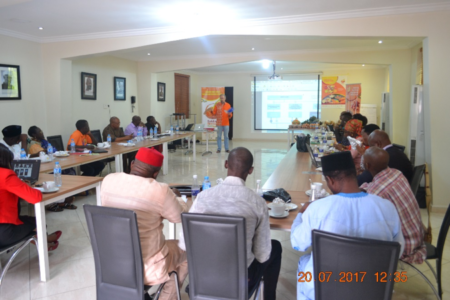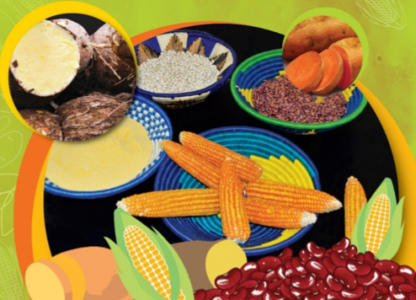Micronutrient malnutrition; commonly referred to as hidden hunger because the symptoms are not always visible; is characterized by chronic deficiency of essential vitamins and minerals (micronutrients) such as vitamin A, iron and zinc. In Nigeria, 30% of preschool aged children are deficient in vitamin A, while 36% of children under five years are stunted. Vitamin A deficiency (VAD) is considered a major public health problem that requires appropriate nutrition interventions. VAD causes morbidity, poor cognitive development, nutritional blindness, reduced immunity, and in some cases, death in children especially under the age of five years and poor productivity in adults.
Orange-fleshed sweetpotato (OFSP) is a special type of biofortified sweetpotato that contains high levels of beta-carotene. Beta-Carotene is an organic, red-orange pigment abundant in plants and fruits. Beta-carotene is what gives OFSP an orange color and is converted to Vitamin A in the body after consumption to provide additional nutritional benefits. Biofortification enhances the nutritional value of staple food crops by increasing the density of vitamins and minerals in a crop through either conventional plant breeding, agronomic practices or biotechnology. Examples of these vitamins and minerals that can be increased through biofortification include provitamin A Carotenoids, zinc and iron.
An OFSP platform for Nigeria has been established to catalyse OFSP scaling up efforts. The Building Nutritious Food Baskets Project (BNFB) facilitated a formal platform launch event which took place at the De Meros Hotel and Suites, Lagos Nigeria on 20th July. Participants at the launch included representatives from Nigeria Agricultural Development Programs (ADPs), National Agricultural Seed Council (NASC), NARIS, school feeding programme, processors, farmers and academic institutions.

Yarama D. Ndirpaya from Agricultrual Research Council in Nigeria (ARCN), Abuja remarked that sweetpotato is a high value; high yielding food security crop and as such Nigeria should highly invest in its production and consumption.
The platform will provide a forum for OFSP stakeholders to exchange ideas and share information and knowledge on seed systems, production, processing, utilization/consumption and marketing. The platform will contribute to the agenda of fighting hidden hunger in Nigeria by linking different stakeholders to relevant authorities on matters relating to OFSP and provide opportunity for capacity development for members on critical identified gaps relating to OFSP and biofortification in general.
Membership of the platform is expected to grow, being multi-sectoral and multi-disciplinary, including actors from the ministry of health, nutrition and education, school feeding programs, academic institutions, national agricultural research systems (NARS) among others. The platform will be led and sustained by elected executives from national partners who understand the sector’s system with its peculiar bottlenecks, and can advocate for its growth, experienced in public-private partnership, and can better drive their own agenda.
OFSP – a staple food in Nigeria – can serve as a cheap and sustainable source of Vitamin A, especially for vulnerable populations. The two OFSP varieties available are UMUSPO3 locally referred to as ‘Mothers Delight’ and UMUSPO1 commonly referred to as ‘King J’. Mothers Delight is more preferred and highly promoted in Nigeria because it contains high levels of beta-carotene. King J was released in December, 2012 while mothers Delight was released in June 2013.
Sweetpotato is an important food and nutrition security root crop. Nigeria is the third largest producer in the world after China and Uganda with an annual production estimated at 3.9 million metric tons per year. It can thrive in marginal soil and has broad agro-ecological adaptability, which makes it thrive in all of Nigeria’s 36 states. Sweetpotato has a short production cycle (3-4 months), can be grown all year round while its roots and vines can be used for both human and animal consumption. However, it’s production still faces some challenges along the value chain that result into relatively low yields, limited utilization and consumption. These challenges include poor agronomic practices, limited processing capacity, poor vine and root storage technologies, poor communication (flow of information) among key actors along the value chain.

The International Potato Center (CIP) is collaborating with a consortium of CGIAR research centers; Governments of Nigeria and Tanzania and national partners on an initiative called Building Nutritious Food Baskets Project (BNFB), which is testing a scaling-up model through a multi-crop (food basket) approach to address hidden hunger by catalyzing sustainable investments for the production and utilization of biofortified crops that are ready for scaling up including; Orange-fleshed sweetpotato (OFSP); vitamin A (yellow) cassava, vitamin A (orange) maize and high iron/zinc beans. The project mainly targets rural populations, especially young children under the age of five and women of reproductive age, in Nigeria and Tanzania.
Article by Joyce Maru
Capacity Development & Communication Specialist (BNFB)
